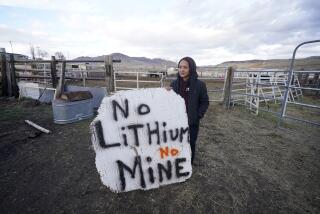Deadline Set for Progress on Indian Trust Fund Reform
- Share via
WASHINGTON — A federal judge has given lawyers for the Interior Department and U.S. Treasury and attorneys representing thousands of Native Americans until Nov. 1 to show that they are close to reaching agreement on overhauling the government’s long-troubled Indian trust fund system.
U.S. District Judge Royce C. Lamberth, impatient with federal efforts to clean up a nearly 170-year history of mismanagement that has cost Native Americans billions of dollars in lost income, said that he will take firm action unless progress toward a mediated settlement is soon apparent.
Lamberth, in an order made public Thursday, said that George Washington University law professor Stephen Saltzburg was named earlier this month to mediate issues arising from a six-week summer trial that illuminated the government’s gross mismanagement of $350 million a year from sales of natural resources on Native Americans’ land.
It was understood that the private negotiations were requested by government lawyers, with the concurrence of Native American attorneys.
If progress is not apparent by early November, Lamberth said, he will issue an opinion that legal sources expect would excoriate the government and perhaps award monetary damages to 300,000 Native Americans. The case is the largest class-action lawsuit in history against the federal government.
“The parties will appear before the court . . . on Nov. 1, 1999, at which time the court will decide whether mediation should continue or whether at that time the court should release its opinion regarding the trial that concluded July 1999,” Lamberth’s order said.
Attorneys in the case and Saltzburg declined comment on the order, citing a stern warning by Lamberth that “discussions and communications including documents will be confidential.”
“This is a totally confidential process,” Saltzburg said, declining to answer questions.
The trust funds were established in the 1830s during the Andrew Jackson administration, part of a government effort to compensate individual Native Americans for use of their land while weakening tribal control of valuable assets.
The government is supposed to manage the accounts and pass along royalties from the sale of petroleum, timber and other natural resources. The government said it deposited about $350 million a year into the accounts. But officials have been unable to give an accounting of where all the money has gone, citing destroyed or damaged documents and an antiquated record system.
Native American plaintiffs, who filed their lawsuit in 1996, contend that the court should grant them millions of dollars in lost income, order a full accounting by the government and ensure a complete overhaul of the system.
Some legal authorities believe that, although the court can order a complete restructuring of the system, only the U.S. Court of Claims can award large damages for past mismanagement.
Congress was made aware of the problem in 1994 and passed legislation to require massive reforms in the trust system. But the intended revisions never took root, largely because of bureaucratic bickering within the Interior Department, which oversees most issues affecting Native Americans.
Interior Secretary Bruce Babbitt told the court last summer that efforts to reform the trust are in the works. Although the situation is complex, reforms will be well underway by the time President Clinton leaves office in January 2001, without any intervention by the federal court, Babbitt testified.
The lawsuit covers individual trust accounts of Native Americans in every state west of the Mississippi River. Most of those affected in California are members of the Hoopa and Klamath tribes in the northern part of the state.
However, if the current suit is successful, hundreds of tribes with so-called tribal accounts--as opposed to the individual accounts involved in the current lawsuit--are prepared to follow up with similar class actions. These tribes include “dozens all throughout Southern California,” said Native American lawyer Keith Harper.
More to Read
Sign up for Essential California
The most important California stories and recommendations in your inbox every morning.
You may occasionally receive promotional content from the Los Angeles Times.













